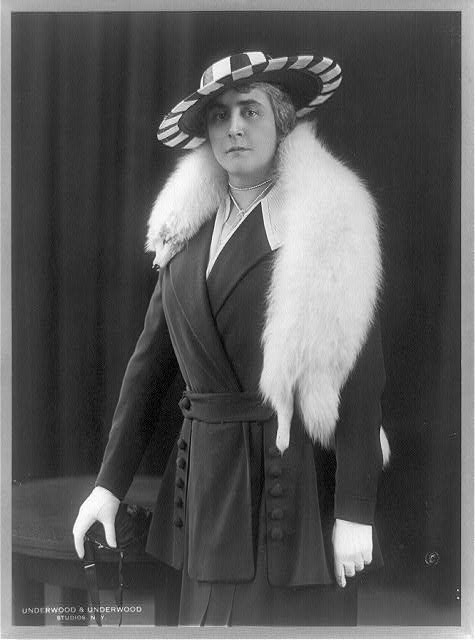1873 - 1952
Date Added:

Born on July 25th, 1873, Anne Morgan was born to a very wealthy business family. Her father, JP Morgan, was one of the most successful bankers and financiers of The Gilded Age (noted for his co-founding of JP Morgan Chase Bank). Anne grew up on her family’s estate in New York City and had a thorough education as a result of her private tutors. As an adult, she was able to use her family’s wealth and connections to bring awareness to issues that she felt were important, like the women’s suffrage movement or the harsh working conditions of lower class immigrant workers. Anne Morgan dedicated her time and affluence to bettering the lives of NYC’s women. In 1903, she helped found New York City’s first women’s social club, the Colony Club. She later worked with the National Civic Federation to provide food to underprivileged women workers in New York. In 1910 she joined the American Woman’s Association (AWA), helping working women invest their money to fund personal pursuits. Around the same time, issues concerning the safety of factory laborers reached an all time high in NYC. Factory workers, especially lower class immigrant women, worked long hours for low wages. In addition to being overworked, they also resided in a very unsafe work environment with cramped spaces and unregulated machinery. As a result of workers protesting, over privileged independent factory owners hired private police and thugs to silence and restrict them. Anne Morgan, along with other wealthy socialites formed a committee within the Women’s Trade Union League (WTUL) to protect strikers from the abuse they were being subjected to. She helped raise funds for strikes and used her status to garner media attention and publicity towards the desperate cause. She and her comrades even risked their own safety by participating in the protests themselves. They believed that police violence would be less likely to ensue if members of high society walked among the protestors. That way, the safety provided to them as a result of they high status was extended to the less fortunate women. While she did withdraw her support from the Triangle Strike because she disagreed with the unions’ “socialist rhetoric”, she remained a member of AWA and WTUL. She funded her suffragist and philanthropist endeavors with the $3 million inheritance she received upon her father’s death. Anne’s achievements were recognized by a medal from the National Institute of Social Science in 1915 after she published her book on the education of the American woman. During both World Wars, she spent time in France aiding in relief efforts in communities. Anne also went on to establish The American Friends for Devastated France which was a committee that provided health services, housing, and food to soldiers and refugees. Anne Morgan spent a majority of her life aiding in the advancement of working women and displayed a great deal of generosity and empathy to those less fortunate than herself. Her actions emphasize the importance of using one’s own privilege to help others for the sake of humanity and justice. Anne Morgan’s relentless efforts allowed women to have take a step ahead in the ongoing battle for women’s rights and the dismantling of the patriarchy.
Share your thoughts on this story with us. Your comments will not be made public.
Email
Copyright ©2016 - Design By Bureau Blank